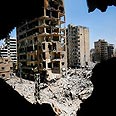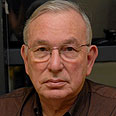In a speech delivered by the prime minister Tuesday, he declared that the face of the Middle East has already changed. How has it changed? The only implication stemming from the speech is that Israel renewed its deterrent power.
Deterrent Power is not an insignificant matter, but we must recall that almost all our wars broke out at a time where we thought our enemies fear us. If Hamas and Islamic Jihad are not deterred, even though we kill their members persistently, there's no reason to assume the zealous organization nesting in the North would leave us alone.
Zealotry comes from deep well we have no ability to dry up.
False assumption
Doubts regarding the impression of the beatings on our enemies' mood also stems from the IDF's modest accomplishments. The strategy chosen by the government was premised on the assumption that pressure on the Lebanese government would push it to implement US Security Council Resolution 1559.
This assumption was proven false and the war was extended. The more drawn out it became, the more anger it aroused in Lebanon over the destruction we sowed, while dissipating the hope that the Siniora government would attempt to enforce its authority over the Shiite Hizbullah organization.
The domino pieces, which were supposed to fall forward, one after another, ended up falling backwards. The length of time our army needed boosted Hizbullah's image of bravery, increased the likelihood of a disaster like the one in the village of Qana, and weakened Western public support for Israel.
Retrospective wisdom
Now, in the last few days of war we still have left, we're dispatching large forces to Lebanon and trying to accomplish what we were late in achieving.
Caution requires us to add that this is retrospective wisdom. It will be some time before we find out how decisions were taken by the government, and one question is of particular interest: Where the objectives assigned to the army too extensive, or did the military erred by not demanding to invest more troops in order to achieve the goals it was tasked with?
A temporary assumption: We should have been more modest in earmarking objectives while hitting quickly and with more force by using infantry troops and reservists. Minimizing expectations does not limit a statesman who aspires for huge accomplishments, but grants flexibility and prevents bitter disappointment.
And regarding the final result: The plan currently presented to the public ties the end of the war to the arrival of a multinational force at the border strip we're "cleaning up" for it. But what if this international force doesn't arrive, or takes a long time to form? That time should be used to bargain about its makeup and roles.
No need for foreign troops on our border
On this front it is worthy to turn our attention to a document prepared by the Jerusalem Center for Public Affairs, drafted by former IDF Chief of Staff Moshe Yaalon and retired Major General Yaakov Amidror. The two rule that the role of an international force should be to train and strengthen Lebanon's army, prevent the smuggling of weapons from Syria, and uncover Hizbullah's weapons caches.
To this end, there is no need to deploy the force on our border, but rather, at Syria-Lebanon border crossings as well as the Beqaa Valley.
According to the document, the force should also rush to the aid of Lebanon's government should Hizbullah attempt to topple it. The two also demand that any agreement ban the construction of military fortifications in southern Lebanon.
Those are worthy goals we should aim for, but Syria and Hizbullah's objection to the deployment of a multinational force presents the United Nations with a challenge it cannot overcome. As a result, we can assume the fighting will continue for an unknown period of time and take the familiar form of holding on to a security zone in the face of guerrilla attacks.
Peace will not prevail. A different agreement will require a wide-scale diplomatic effort that involves dialogue with Syria and Iran.

















